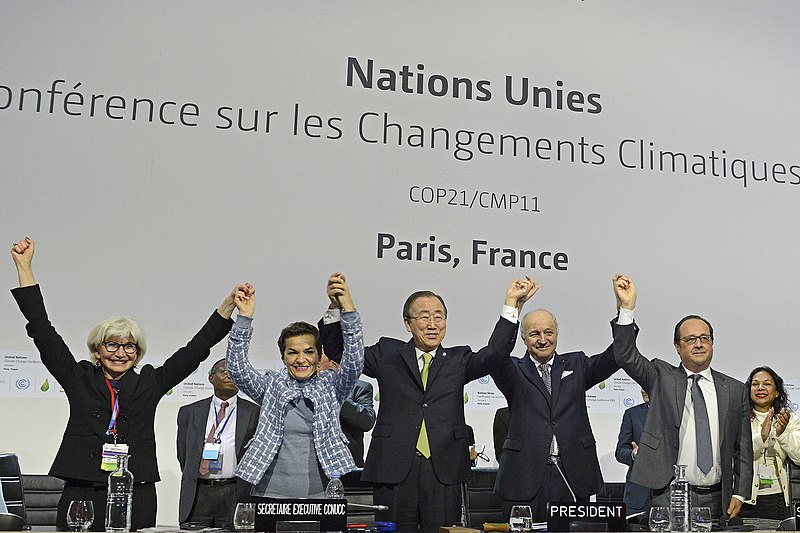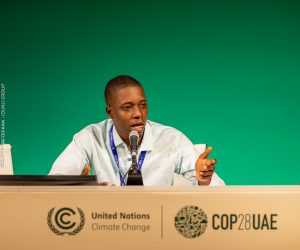Guidance on Enhancing Paris NDC Targets in 2020

Image Source: UNFCCC (December 2015)
Plenary session of the COP21 for the adoption of the Paris Accord, United Nations Climate Change Conference (Paris, Le Bourget)
Download
Developed by the CVF Expert Advisory Group*
6 December 2020
- There can be no ambiguity that all nations agreed world governments to be called, in this 5th anniversary year of the Paris Agreement, to submit new or updated 2030 climate targets, known as “NDCs”, the Nationally Determined Contributions which underlie this landmark Agreement. The need for new or updated 2020 NDCs has been clear since the UNFCCC December 2015 decision to adopt the Paris Agreement, specifically that decision’s articles 23-24.
- NDCs spell out what governments commit to contribute towards achieving the aims of the Paris Agreement, making it possible or not to realize these. Amid a worsening climate emergency, this is why the “Chile-Madrid Time for Action” decision at the last UNFCCC COP in December 2019 called on all nations “to use the opportunity in 2020 to reflect the highest possible ambition” and stressed that each NDC climate target “will represent a progression beyond the Party’s then current NDC.”
- Due to the pandemic, COP26 was shifted to November 2021, with the UK presidency of this upcoming COP stressing that an ambitious roadmap for climate action would nevertheless be pursued despite the postponement of the summit. The UNFCCC secretariat provided clarity in a communication to all parties in August of 2020 on the current and imminent midnight 31 December 2020 NDC deadline, strongly encouraging the submission of updated or new national climate target NDCs within this delivery year.
- The commitments of governments at the time the Paris Agreement was negotiated and adopted amounted to planetary warming around or in excess of 3 degrees of climate heating, an unconscionable scenario of triple the global warming experienced to-date. That was why in Paris it was decided to call countries back by 2020 with climate targets, giving them a chance to do better and save the accord. This was the “ambition mechanism” that allowed the celebration of Paris, provided, clearly, that governments followed through with the commitments to upgrade their efforts at least every five years. Any individual country may raise its NDC climate targets at any moment, but the collective call to all parties is once every five years.
- As it stands, greenhouse gas emissions are higher than in 2015 and UNEP has declared that the world is at the “brink”, now requiring more than 7% global emission reductions every single year to 2030 just to keep the 1.5 degrees Celsius goal from falling out of reach. This places extreme pressure on the Paris Agreement signatories to deliver. Yet, while the bulk of nations committed to submitting stronger NDCs this year, nearly all countries have still, at this late hour, not yet updated or improved on their NDC climate targets since they were first developed in 2015.
- Since the onset of the pandemic, however, 120 governments have committed to submit enhanced, updated 2030 NDC climate targets. At the time of publication of this guidance, a tally of 154 governments were now committed to do so. Those committing or delivering on stronger 2030 NDC climate targets include from the African nations, AOSIS, China, the EU, the CVF, the LDC Group, and the UK, among others. Despite suffering colossal loss and damage at around 1 degree of warming, and this year concurrent COVID-19 pandemic and climate crises, a number of the least responsible and most climate threatened nations have been stepping forward already in 2020 with new and enhanced NDCs, as is being tracked on the CVF’s Climate Survival Leadership Barometer.
- The next date when there is a decision basis in the UNFCCC for all countries to submit enhanced and updated NDC climate targets is in 2025, half a decade away, which is why 2020 delivery is vital for the protection of the planet and all its people, especially the most vulnerable. COP26 itself, though, in November of 2021, could reach a new decision to call for enhanced targets earlier depending on the findings of the UNFCCC’s forthcoming February and any subsequent 2021 Synthesis Report of all nations’ latest commitments through NDCs including by midnight on 31 December 2020. Such a decision would be justified by the requirements of the Article 2 goals of the Paris Agreement which legally bind all nations to strive to limit global warming to 1.5 degrees and to make-up shortfalls towards that goal.
- There are several ways in which countries’ NDCs can be improved. Adaptation and resilience, which feature in some 70% of the first set of NDCs, can be strengthened through raised targets and expanded actions. Emission targets should be strengthened, and new sectoral targets, or economy-wide coverage can be achieved. Commitments to following human-rights, and incorporating gender-based approaches, maximizing synergies with the Sustainable Development Goals, advancing the just transition and enhancing sub-national/local level action may be considered for incorporation. Conformity with reporting guidelines can also be improved upon. These are some of the multiple ways in which countries can improve on their NDCs.
- There are also multiple reporting formats of NDCs that have been employed by governments conveying information on their national 2030 NDC climate targets to the UNFCCC. At COP24 in Katowice, the UNFCCC adopted guidelines on transparency and reporting known by the acronym of “ICTU” (short for “information to facilitate clarity, transparency and understanding of NDCs”), which is the uniform reporting framework for the upcoming NDCs. Parties, though, have been sending update communications on their NDCs with as little as one paragraph or 1-2 pages.
- What is most important to achievement of the aims of the Paris Agreement though, is whether or not the actual NDC climate targets have been strengthened. What is obvious is that it will never be possible to deviate from a trajectory of 3 degrees all the way back to 1.5 degrees of warming unless countries increase their numerical emissions targets at least every five years: in 2020, in 2025, again in 2030, and most likely thereafter also. Doing so is therefore the minimum measure of what constitutes enhanced ambition for tackling climate pollution with NDCs.
- Under Paris Agreement principles such NDC stipulations apply to all countries in 2020. The Paris Agreement, though, has a range of provisions to resolve equity and capability challenges, including: calling on early and robust leadership from developed nations, provision of at minimum $100 billion US per year of climate finance for developing countries alongside conventional pledged development assistance, technology transfer and development, capacity building and technical assistance programs, and mechanisms to address loss and damage. These and other provisions also need to be delivered on to support ambition in Paris Agreement implementation.
- Some developing countries may need to make their targets conditional to finance and other international support due to capacity and resource restrictions that inhibit action. This is why wealthier nations’ commitments to finance is a key element of supporting the enhanced ambition NDCs of developing countries, and why meeting or surpassing the $100 billion climate finance commitment is so vital. It is likewise inconsistent with UNFCCC decisions for “the highest possible ambition” NDC targets not to be reflected by all countries. Therefore, all governments, big and small, should, in 2020, raise the level of the ambition of their 2030 NDC climate targets, to the maximum of the possible adaptation, mitigation and other sectoral potential that is available to each country, with developing countries also articulating any assistance needs to deliver these. This is what it means to be a party to the Paris Agreement. There is very little time ahead of the midnight NDC deadline and still few countries delivering so this effort should constitute an emergency priority for the climate during the remainder of 2020.
*The CVF Expert Advisory Group is an independent expert body commissioned by the CVF that provides advice to its members and on activities of the CVF, and is chaired by Prof. Dr. Saleemul Huq, with Deputy Co-Chairs Farhana Yamin and Renato Redentor Constantino, and members Bill Hare, D.Sc., and Mohamed Adow.
SHARE ON
Related News
21
Dec
The Journey to COP28: A Road to Disappointment and Hope
The Journey to COP28: A Road to Disappointment and Hope
By Jodahi Bezabih Petros, CVF Youth Fellow from Ethiopia
Com...
21
Dec
The Loss and Damage Fund: A glimmer of hope or an avenue for more questions?
The Loss and Damage Fund: A glimmer of hope or an avenue for more questions?
By Barbra Kangwana, CVF Youth Fellow fro...
21
Dec
Carbon Markets’ Contribution to Climate Action: Perspectives Following COP28
Carbon Markets’ Contribution to Climate Action: Perspectives Following COP28
By Koto Daniel Dagnon, CVF Youth Fellow ...



